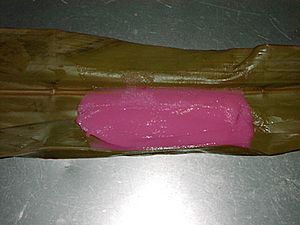Muchi facts for kids
Muchi (ムーチー or 餅, Mūchī) is a special sweet treat from Okinawa Prefecture in Japan. It's also known as onimochi (鬼餅). Muchi is a type of soft, chewy cake made from pounded sticky rice. In the Okinawan language, "Muchi" simply means "rice cake." Sometimes, people call it "Casa Muchi" because it's traditionally wrapped in the large, green leaves of a plant called shell ginger.
What is Muchi Made From?
Muchi is made from a special kind of sticky rice. This rice is pounded until it becomes a soft, dough-like mixture. After that, the dough is mixed with different flavors. Common flavors include brown sugar, white sugar, or even purple yam. Once flavored, each piece of Muchi is carefully wrapped in a shell ginger leaf. Then, it is steamed until it becomes soft and ready to eat.
When Do People Eat Muchi?
Muchi is often eaten in December. People see it as a lucky charm. They eat it to wish for good health and a long life. The coldest time in Okinawa is from late January to early February. This period is called "Muchibisa" in the Okinawan language. During Muchibisa, families often make Muchi together. They make many small, individual cakes called Kassa Muchi. Sometimes, they even make a very large Muchi called Chikara Muchi. Families then share and eat this big one together. People also tie the Muchi treats with string. They hang them from the ceiling as pretty decorations in their homes.
The Legend of Onimochi
The name "Onimochi" comes from an old folktale. This story is from the main island of Okinawa. It was written down about 800 years ago. The tale tells of a man who moved to a new city. This man started attacking people and animals. He turned into a scary demon, known as an "oni." The man's younger sister was very sad about what he had become. She decided to help. She made some Muchi, which her brother loved to eat. She fed it to him. When he was weakened by the Muchi, she pushed him into the sea. This is how she defeated the demon. Because Muchi was used to get rid of the "oni," it is also called "Onimochi."
 | Emma Amos |
 | Edward Mitchell Bannister |
 | Larry D. Alexander |
 | Ernie Barnes |


